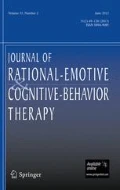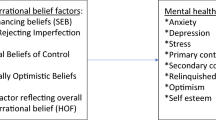Abstract
The Ellis (1962) rational emotive therapy model would predict that individuals characterized by high levels of irrational beliefs would evaluate the impact of personally experienced life events as more negative (or less positive) than would individuals chartacterized by low levels of irrational beliefs. A sample of 155 undergraduate females provided data on irrational beliefs and a life experiences survey which included event impact ratings. The results provided general support for the hypothesis of a relationship between beliefs and perceived impact of stressful life events.
Similar content being viewed by others
References
Bruhn, J.G., & Philips, B.U. (1984). Measuring social support: A synthesis of current approaches.Journal of Behavioral Medicine, 7, 151–169.
Ellis, A. (1962).Reason and emotion in psychotherapy. New York: Lyle Stuart.
Ellis, A. (1982). A reappraisal of rational-emotive therapy's theoretical foundations and therapeutic methods: A reply to Eschenroeder.Cognitive Therapy and Research, 6, 393–398.
Eschenroeder, C. (1982). How rational is rational-emotive therapy? A critical appraisal of its theoretical foundations and therapeutic methods.Cognitive Therapy and Research, 6, 381–392.
Goldfried, M.R., & Sobocinski, D. (1975). Effect of irrational beliefs on emotional arousal.Journal of Consulting and Clinical Psychology, 43, 504–510.
Holmes, T.H., & Rahe, R.H. (1967). The social readjustment rating scale.Journal of Psychosomatic Research, 11, 213–218.
Kassinove, H., Crisci, R., & Tiegerman, S. (1977). Developmental trends in rational thinking: Implications for Rational-Emotive, school mental health programs.Journal of Community Psychology, 5, 266–274.
Knapp, S. (1979). Life events, rationality and emotional disturbance.Psychological Reports, 45, 510.
Lazarus, R.S. (1982). Thoughts on the relation between emotion and cognition.American Psychologist, 37, 1019–1024.
Nelson, R.E. (1977). Irrational beliefs and depression.Journal of Consulting and Clinical Psychology, 45, 1190–1191.
Rabkin J.G., & Struening, E.L. (1976). Life events, stress, and illness.Science, 194, 1013–1020.
Sarason, I.G., Johnson, J.H., & Siegel, J.M. (1978). Assessing the impact of life changes: Development of the Life Experiences Survey.Journal of Consulting and Clinical Psychology, 46, 932–946.
Sarason, I.G., de Monchaux, C., & Hunt, T. (1975). Methodological issues in the assessment of life stress. In L. Levi (Ed.),Emotions—Their parameters and measurement (pp. 499–509). New York: Raven Press.
Vestre, N.D. (1984a). Irational beliefs and self-reported depressed mood.Journal of Abnormal Psychology, 93, 239–241.
Vestre, N.D. (1984b). Test-retest reliability of the Idea Inventory.Psychological Reports, 54, 873–874.
Zajonc, R.B. (1980). Feeling and thinking: Preferences need no inferences.American Psychologist, 35, 151–175.
Author information
Authors and Affiliations
Rights and permissions
About this article
Cite this article
Vestre, N.D., Burnis, J.J. Irrational beliefs and the impact of stressful life events. J Rational-Emot Cognitive-Behav Ther 5, 183–188 (1987). https://doi.org/10.1007/BF01080526
Issue Date:
DOI: https://doi.org/10.1007/BF01080526




